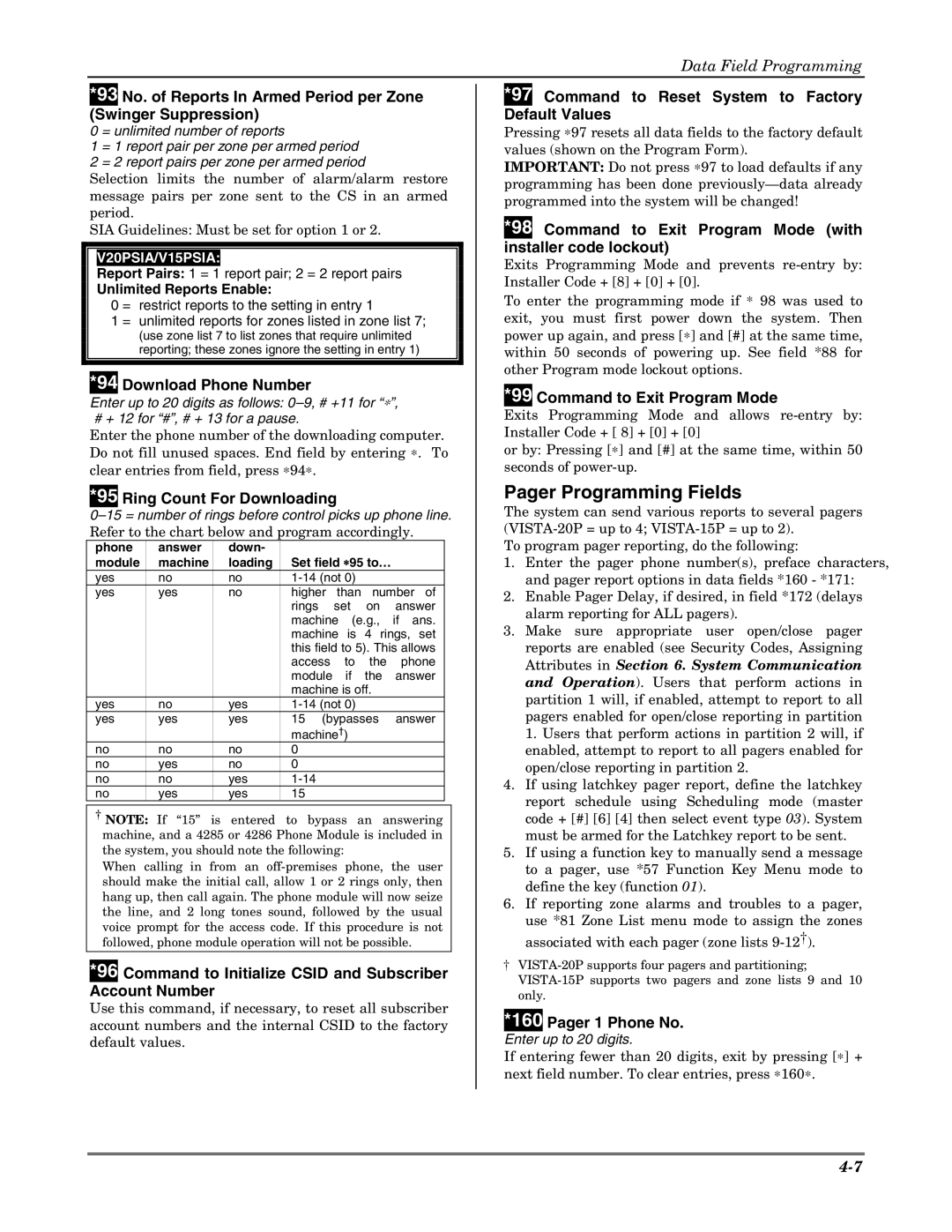
Data Field Programming
*93 No. of Reports In Armed Period per Zone (Swinger Suppression)
0 = unlimited number of reports
1 = 1 report pair per zone per armed period 2 = 2 report pairs per zone per armed period
Selection limits the number of alarm/alarm restore message pairs per zone sent to the CS in an armed period.
SIA Guidelines: Must be set for option 1 or 2.
V20PSIA/V15PSIA:
Report Pairs: 1 = 1 report pair; 2 = 2 report pairs
Unlimited Reports Enable:
0 = restrict reports to the setting in entry 1
1 = unlimited reports for zones listed in zone list 7;
(use zone list 7 to list zones that require unlimited reporting; these zones ignore the setting in entry 1)
*94 Download Phone Number
Enter up to 20 digits as follows:
# + 12 for “#”, # + 13 for a pause.
Enter the phone number of the downloading computer. Do not fill unused spaces. End field by entering ∗. To clear entries from field, press ∗94∗.
*95 Ring Count For Downloading
0–15 = number of rings before control picks up phone line.
Refer to the chart below and program accordingly.
phone | answer | down- | Set field ∗95 to… |
| ||
module | machine | loading |
| |||
yes | no | no |
|
| ||
yes | yes | no | higher | than | number of | |
|
|
| rings | set | on | answer |
|
|
| machine (e.g., | if ans. | ||
|
|
| machine is 4 rings, set | |||
|
|
| this field to 5). This allows | |||
|
|
| access | to | the | phone |
|
|
| module | if | the | answer |
|
|
| machine is off. |
| ||
yes | no | yes |
|
| ||
yes | yes | yes | 15 (bypasses | answer | ||
|
|
| machine†) |
|
| |
no | no | no | 0 |
|
|
|
no | yes | no | 0 |
|
|
|
no | no | yes |
|
|
| |
no | yes | yes | 15 |
|
|
|
†NOTE: If “15” is entered to bypass an answering machine, and a 4285 or 4286 Phone Module is included in the system, you should note the following:
When calling in from an
*96 Command to Initialize CSID and Subscriber Account Number
Use this command, if necessary, to reset all subscriber account numbers and the internal CSID to the factory default values.
*97 Command to Reset System to Factory Default Values
Pressing ∗97 resets all data fields to the factory default values (shown on the Program Form).
IMPORTANT: Do not press ∗97 to load defaults if any programming has been done
*98 Command to Exit Program Mode (with installer code lockout)
Exits Programming Mode and prevents
To enter the programming mode if ∗ 98 was used to exit, you must first power down the system. Then power up again, and press [∗] and [#] at the same time, within 50 seconds of powering up. See field *88 for other Program mode lockout options.
*99 Command to Exit Program Mode
Exits Programming Mode and allows
or by: Pressing [∗] and [#] at the same time, within 50 seconds of
Pager Programming Fields
The system can send various reports to several pagers
To program pager reporting, do the following:
1.Enter the pager phone number(s), preface characters, and pager report options in data fields *160 - *171:
2.Enable Pager Delay, if desired, in field *172 (delays alarm reporting for ALL pagers).
3.Make sure appropriate user open/close pager reports are enabled (see Security Codes, Assigning Attributes in Section 6. System Communication and Operation). Users that perform actions in partition 1 will, if enabled, attempt to report to all pagers enabled for open/close reporting in partition 1. Users that perform actions in partition 2 will, if enabled, attempt to report to all pagers enabled for open/close reporting in partition 2.
4.If using latchkey pager report, define the latchkey report schedule using Scheduling mode (master code + [#] [6] [4] then select event type 03). System must be armed for the Latchkey report to be sent.
5.If using a function key to manually send a message to a pager, use *57 Function Key Menu mode to define the key (function 01).
6.If reporting zone alarms and troubles to a pager, use *81 Zone List menu mode to assign the zones associated with each pager (zone lists
†
*160 Pager 1 Phone No.
Enter up to 20 digits.
If entering fewer than 20 digits, exit by pressing [∗] + next field number. To clear entries, press ∗160∗.
